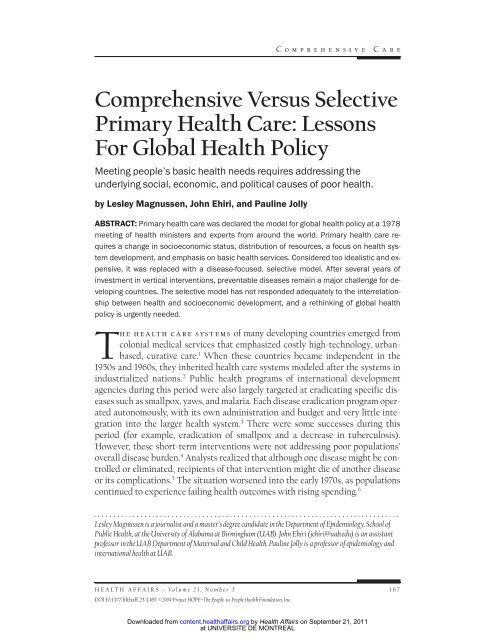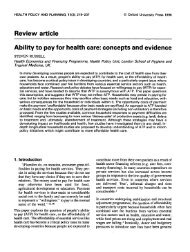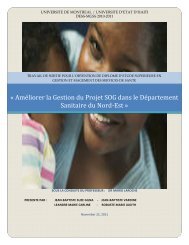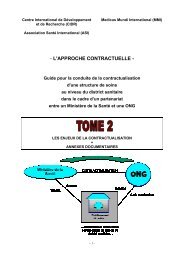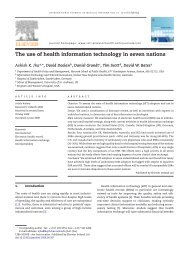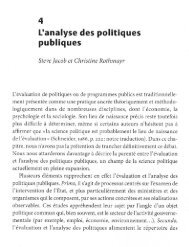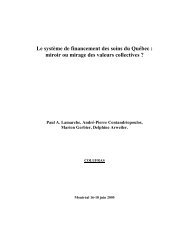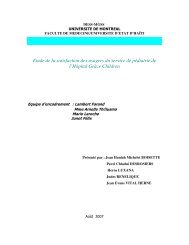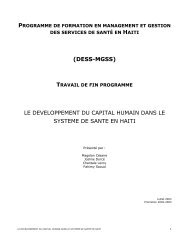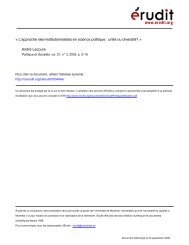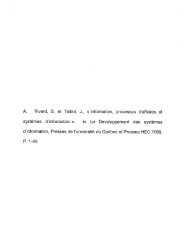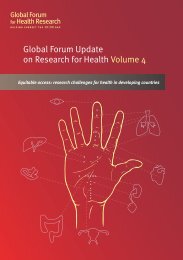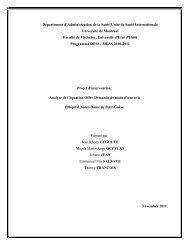Comprehensive<strong>Care</strong>Comprehensive Versus SelectivePrimary <strong>Health</strong> <strong>Care</strong>: LessonsFor Global <strong>Health</strong> <strong>Policy</strong>Meeting people’s basic health needs requires addressing <strong>the</strong>underlying social, economic, <strong>and</strong> political causes <strong>of</strong> poor health.by Lesley Magnussen, John Ehiri, <strong>and</strong> Pauline JollyABSTRACT: Primary health care was declared <strong>the</strong> model for global health policy at a 1978meeting <strong>of</strong> health ministers <strong>and</strong> experts from around <strong>the</strong> world. Primary health care requiresa change in socioeconomic status, distribution <strong>of</strong> resources, a focus on health systemdevelopment, <strong>and</strong> emphasis on basic health services. Considered too idealistic <strong>and</strong> expensive,it was replaced with a disease-focused, selective model. After several years <strong>of</strong>investment in vertical interventions, preventable diseases remain a major challenge for developingcountries. The selective model has not responded adequately to <strong>the</strong> interrelationshipbetween health <strong>and</strong> socioeconomic development, <strong>and</strong> a rethinking <strong>of</strong> global healthpolicy is urgently needed.The health care systems <strong>of</strong> many developing countries emerged fromcolonial medical services that emphasized costly high-technology, urbanbased,curative care. 1 When <strong>the</strong>se countries became independent in <strong>the</strong>1950s <strong>and</strong> 1960s, <strong>the</strong>y inherited health care systems modeled after <strong>the</strong> systems inindustrialized nations. 2 Public health programs <strong>of</strong> international developmentagencies during this period were also largely targeted at eradicating specific diseasessuch as smallpox, yaws, <strong>and</strong> malaria. Each disease eradication program operatedautonomously, with its own administration <strong>and</strong> budget <strong>and</strong> very little integrationinto <strong>the</strong> larger health system. 3 There were some successes during thisperiod (for example, eradication <strong>of</strong> smallpox <strong>and</strong> a decrease in tuberculosis).However, <strong>the</strong>se short-term interventions were not addressing poor populations’overall disease burden. 4 Analysts realized that although one disease might be controlledor eliminated, recipients <strong>of</strong> that intervention might die <strong>of</strong> ano<strong>the</strong>r diseaseor its complications. 5 The situation worsened into <strong>the</strong> early 1970s, as populationscontinued to experience failing health outcomes with rising spending. 6Lesley Magnussen is a journalist <strong>and</strong> a master’s degree c<strong>and</strong>idate in <strong>the</strong> Department <strong>of</strong> Epidemiology, School <strong>of</strong>Public <strong>Health</strong>, at <strong>the</strong> University <strong>of</strong> Alabama at Birmingham (UAB). John Ehiri (jehiri@uab.edu) is an assistantpr<strong>of</strong>essor in <strong>the</strong> UAB Department <strong>of</strong> Maternal <strong>and</strong> Child <strong>Health</strong>. Pauline Jolly is a pr<strong>of</strong>essor <strong>of</strong> epidemiology <strong>and</strong>international health at UAB.HEALTH AFFAIRS ~ Volume 23, Number 3 167DOI <strong>10.1377</strong>/hlthaff.23.3.167 ©2004 Project HOPE–The People-to-People <strong>Health</strong> Foundation, Inc.Downloaded from content.healthaffairs.org by <strong>Health</strong> Affairs on September 21, 2011at UNIVERSITE DE MONTREAL
AgreementsRecognizing that narrow targets were not <strong>the</strong> only option, countries attemptedto implement comprehensive approaches to <strong>the</strong> provision <strong>of</strong> basic health services.Examples included <strong>the</strong> creation <strong>of</strong> <strong>the</strong> rural health center, staffed by medical <strong>and</strong>health assistants <strong>and</strong> supported by <strong>the</strong> Bhore Commission in India; <strong>the</strong> implementation<strong>of</strong> “community-based health programs” in Nicaragua, Costa Rica, Guatemala,Honduras, Mexico, Bangladesh, <strong>and</strong> <strong>the</strong> Philippines; <strong>and</strong> <strong>the</strong> barefoot doctorprogram in China. 7 As part <strong>of</strong> <strong>the</strong> overall efforts to improve population health,<strong>the</strong>se countries brought a new <strong>the</strong>me to international health discourse: commitmentto social equity in health services. Social equity means that although differentsocioeconomic levels exist, <strong>the</strong> gaps between those levels are not insurmountable. 8Examples from <strong>the</strong>se countries contributed to <strong>the</strong> optimism that inequity couldbe tackled to improve global health. Introduction <strong>of</strong> “health for all.” By <strong>the</strong> mid-1970s international health agencies<strong>and</strong> experts began to examine alternative approaches to health improvement indeveloping countries. The impressive health gains in China as a result <strong>of</strong> its community-basedhealth programs <strong>and</strong> similar approaches elsewhere stood in contrast to<strong>the</strong> poor results <strong>of</strong> disease-focused programs. Soon this bottom-up approach thatemphasized prevention <strong>and</strong> managed health problems in <strong>the</strong>ir social contextsemerged as an attractive alternative to <strong>the</strong> top-down, high-tech approach <strong>and</strong> raisedoptimism about <strong>the</strong> feasibility <strong>of</strong> tackling inequity to improve global health. Thus,“health for all” was introduced to global health planners <strong>and</strong> practitioners by <strong>the</strong>World <strong>Health</strong> Organization (WHO) <strong>and</strong> <strong>the</strong> United Nations Children’s Fund(UNICEF) at <strong>the</strong> International Conference on Primary <strong>Health</strong> <strong>Care</strong> in Alma <strong>At</strong>a,Kazakhstan, in 1978. 9 The declaration was intended to revolutionize <strong>and</strong> reform previoushealth policies <strong>and</strong> plans used in developing countries, <strong>and</strong> it reaffirmedWHO’s definition <strong>of</strong> health in 1946: “a state <strong>of</strong> complete physical, mental, <strong>and</strong> socialwell being, <strong>and</strong> not merely <strong>the</strong> absence <strong>of</strong> disease or infirmity.” 10 The conference declaredthat health is a fundamental human right <strong>and</strong> that attainment <strong>of</strong> <strong>the</strong> highestpossible level <strong>of</strong> health was an important worldwide social goal.To achieve <strong>the</strong> goal <strong>of</strong> health for all, global health agencies pledged to work towardmeeting people’s basic health needs through a comprehensive approachcalled primary health care. Primary health care as envisioned at Alma <strong>At</strong>a hadstrong sociopolitical implications. It explicitly outlined a strategy that would respondmore equitably, appropriately, <strong>and</strong> effectively to basic health needs <strong>and</strong> alsoaddress <strong>the</strong> underlying social, economic, <strong>and</strong> political causes <strong>of</strong> poor health. 11 Itwas to be underpinned by universal accessibility <strong>and</strong> coverage on <strong>the</strong> basis <strong>of</strong>need, with emphasis on disease prevention <strong>and</strong> health promotion, communityparticipation, self-reliance, <strong>and</strong> intersectoral collaboration. 12 It acknowledgedthat poverty, social unrest <strong>and</strong> instability, <strong>the</strong> environment, <strong>and</strong> lack <strong>of</strong> basic resourcescontribute to poor health status. It outlined eight elements that future interventionswould use to fulfill <strong>the</strong> goal <strong>of</strong> health improvement: education concerningprevailing health problems <strong>and</strong> methods <strong>of</strong> preventing <strong>and</strong> controlling168 May/June 2004Downloaded from content.healthaffairs.org by <strong>Health</strong> Affairs on September 21, 2011at UNIVERSITE DE MONTREAL


